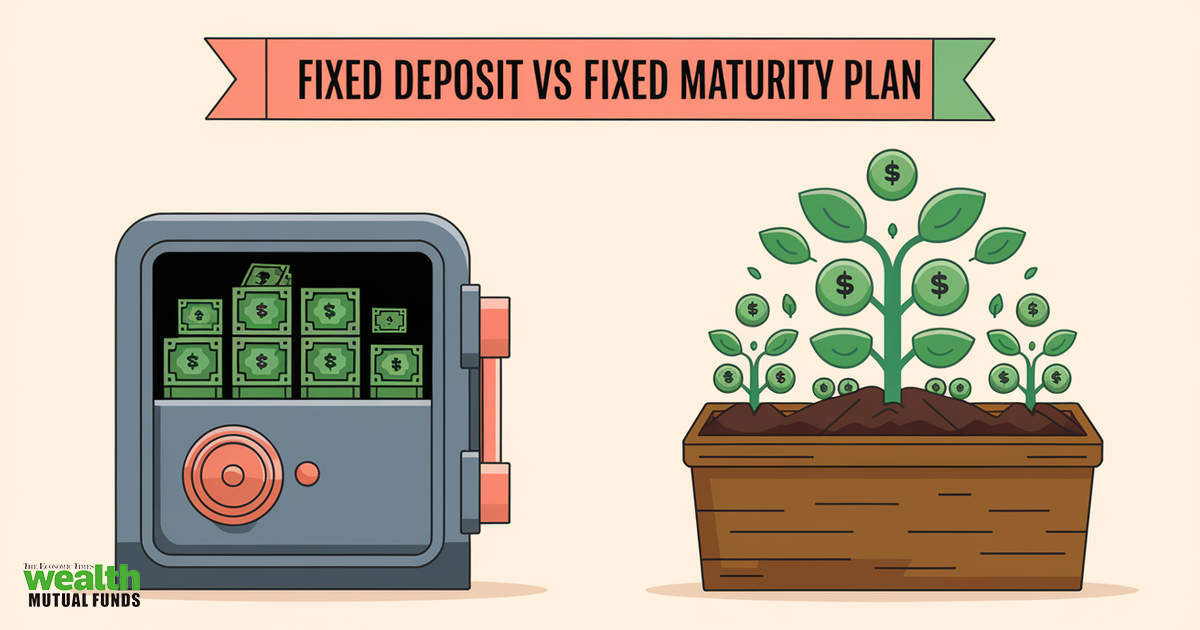Both are popular for their perceived security and predictability, but they serve different needs and have distinctive features.
Below we present a comparative overview of these two investment avenues.
Fixed Deposits (FD)
Fixed deposits are one of the most traditional investment options in India, offered by banks and financial institutions. fixed deposit Term deposit is the most popular term deposit product, where we deposit our surplus funds at a predetermined interest rate for a specific period of time. While the interest rates on FMPs are indicative, the interest rates on fixed deposits are secured. They are known for their guaranteed returns and low interest rates. riskThese are the main features of FDs:
- Guaranteed returns:The interest rate is fixed at the time of investment and does not change during the term, providing assured returns.
- Liquidity:FDs can be withdrawn before maturity, but this usually incurs a penalty.
- Taxes:Interest earned on fixed-term deposits is subject to tax according to the investor’s income tax bracket, which may reduce the overall return.
- SecurityBank fixed deposits are generally considered safe, especially those in scheduled banks, as they come with deposit insurance cover up to a certain limit.
Fixed Maturity Plans (FMP)
FMPs are closed-end mutual funds that invest in fixed-income securities such as bonds, government securities and corporate debt. They have a fixed maturity period, similar to FDs, but have different risk and return profiles.
An FMP is a debt-based fixed tenure plan, which ends on a predetermined date. FMPs are ideal for those who wish to park their surplus funds for a specific period. returnMany of these schemes are predictable as they invest in certificates of deposit, commercial paper and other fixed interest securities that mature in line with the maturity of the underlying FMP.
- Market-linked returns:Unlike FDs, returns on FMPs are not guaranteed and depend on the performance of the underlying assets. However, they typically offer better returns than FDs due to their exposure to market instruments.
- Tax efficiency:FMPs are more tax-efficient than FDs, especially if held for more than three years. Gains from FMPs are taxed as long-term capital gains (LTCG) with the benefit of indexation, which can significantly reduce the tax liability.
- Liquidity:FMPs are less liquid as they can only be redeemed at maturity. However, some FMPs are listed on stock exchanges, providing a secondary market for investors.
- Risk:While FMPs carry low to moderate risk, they are not completely risk-free. Returns are subject to interest rate movements and the credit risk of the underlying securities.
Key Differences Between Fixed Deposits and Fixed Maturity Plans:
- Money back guaranteeFDs offer fixed returns, while FMPs provide market-linked returns.
- TaxesFDs are taxed at the investor’s tier rate, while FMPs benefit from LTCG tax with indexation after three years.
- LiquidityFDs offer the flexibility of early withdrawal (with penalty), while FMPs are locked in until maturity.
- Risk: FDs are low risk. with guaranteed returns, while FMPs carry market-related risks, although generally lower than equity mutual funds.
Currently, the fixed deposit rate of the public sector bank (SBI) is around 6.80% for the general public with a tenor of one to two years. On the other hand, fixed maturity schemes in the last one year have offered returns ranging between 7.33% and 10.01%.
The choice between FD and FMP depends on the investor’s risk appetite, tax considerations and investment horizonFor those seeking security and guaranteed returns, FDs are the ideal choice. However, for investors willing to take on a little more risk in exchange for potentially higher after-tax returns, especially over the long term, FMPs may be a better alternative.
Disclaimer:
The information contained in this post is for general information purposes only. We make no representations or warranties of any kind, express or implied, about the completeness, accuracy, reliability, suitability or availability with respect to the website or the information, products, services, or related graphics contained on the post for any purpose.
We respect the intellectual property rights of content creators. If you are the owner of any material featured on our website and have concerns about its use, please contact us. We are committed to addressing any copyright issues promptly and will remove any material within 2 days of receiving a request from the rightful owner.

